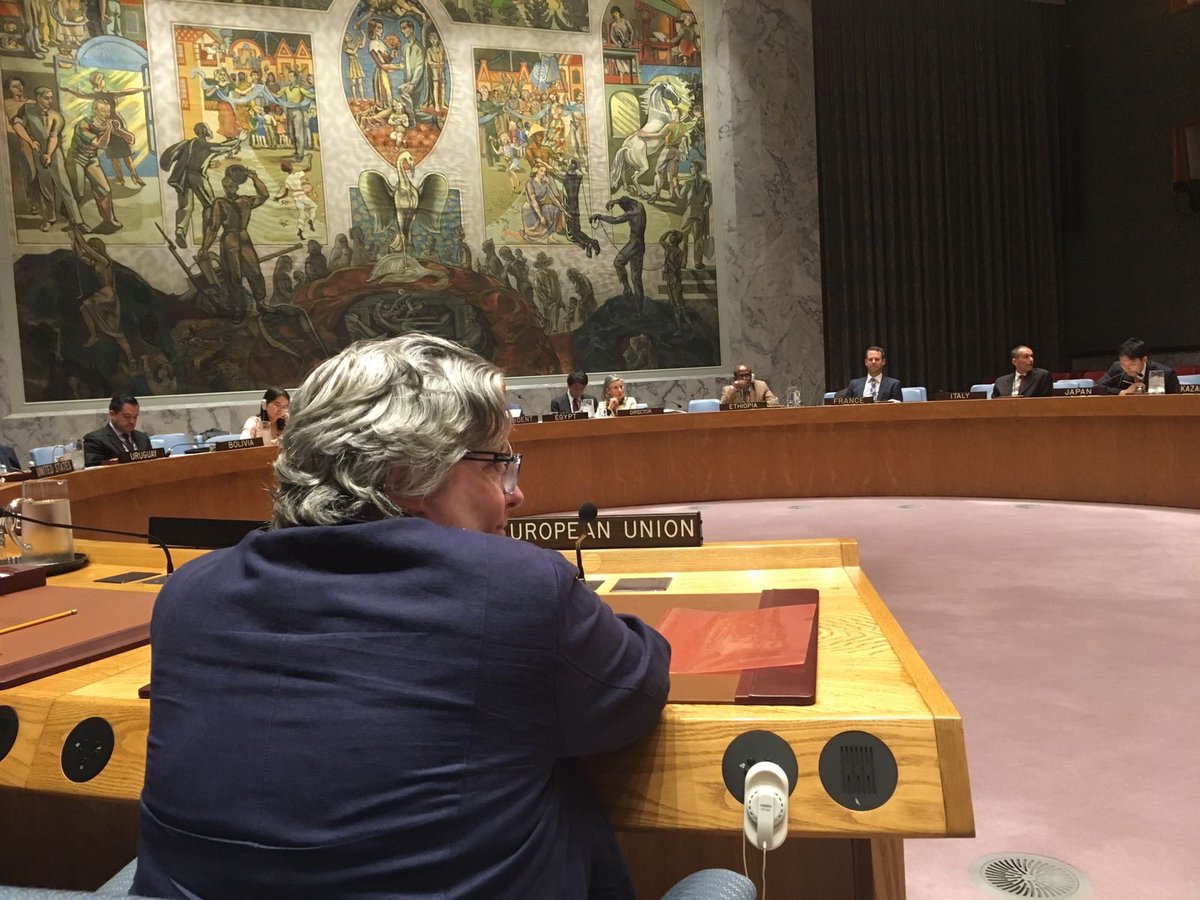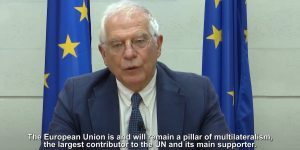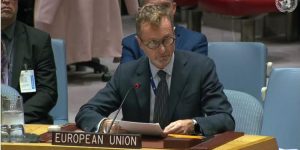8 May 2018, New York
Statement on behalf of the European Union and its Member States by H.E. Ms. Joanne Adamson, Deputy Head of the Delegation of the European Union to the United Nations, at the Security Council Debate on the situation in Bosnia and Herzegovina
– Check against delivery –
Mr President,
I have the honour to speak on behalf of the European Union and its 28 Member States.
The Candidate Countries the former Yugoslav Republic of Macedonia*, Montenegro* and Albania*, and the EFTA country Liechtenstein, member of the European Economic Area, align themselves with this statement.
I join other speakers in welcoming High Representative Valentin Inzko back to the Council and in assuring him of the European Union’s continued support. I also welcome the Permanent Representative of Bosnia and Herzegovina and thank him for his statement.
Monsieur le Président,
I recall stating a year ago that 2016 had been a very good year for Bosnia and Herzegovina, both in terms of reforms and progress towards European integration.
The same cannot be said for 2017. Early electoral campaigning, divisive rhetoric and delayed, if not stalled, reforms have too often occupied the main headlines.
2018 does not have to continue this cycle. Recent developments ranging from the submission of the replies to the Commission Questionnaire, the adoption of excise legislation or the removal of Bosnia and Herzegovina from the list of countries under the Grey List of the Financial Action Task Force, show that results can be obtained if government coalition partners focus on improving the life of citizens and delivering reforms.
Bosnia and Herzegovina has made clear its desire to become a Member of the European Union. This strategic commitment from country’s institutions and leaders should be followed up by concrete reforms, for which there is substantial European Union support. Strengthening Rule of Law and fighting corruption and organized crime are key for advancing socio-economic situation in the country and EU rapprochement.
We are now approaching the end of the current legislature. The implementation of the Reform Agenda has delivered mixed results.
Elections have been officially announced today to be held on October 7th. Official election campaigning will start. The real question for the election campaign is what new proposals on putting into action the Reform Agenda the new government will put forward after the October elections.
This is an opportunity political leaders should seize to show both their citizens and EU Member States their concrete proposals to take forward reforms and improve the lives of citizens.
Today, Bosnia and Herzegovina has still a GDP/capita lower than in the 1980s. The percentage of Bosnia and Herzegovina citizens born in the country and living abroad is the highest in Europe, including the Western Balkans. Emigration of talented young people continues unabated. This brain-drain puts a mortgage on the country’s future.
Monsieur le Président,
Il a souvent été dit que gouverner c’est écrire de la prose, mener une campagne électorale c’est déclamer de la poésie.
Ce dont cette campagne électorale a toutefois besoin, c’est d’une prose, une prose tournée vers l’avenir et mettant en avant un programme politique visant des progrès concrets.
La glorification de criminels de guerre reconnus coupable par une juridiction internationale, jouer la carte sécessionniste ou gloser sur le réarmement, toute cette rhétorique du passé n’a tout simplement pas sa place dans la campagne électorale d’un pays européen aspirant à rejoindre l’Union Européenne.
Malgré un bilan sécuritaire relativement calme, l’Union Européenne maintient dans ce contexte politiquement chargé son soutien ferme à la mission EUFOR Althea et au mandat que ce Conseil lui a octroyé.
Mr President,
The conduct of elections also entails the proper implementation of its results. Unless political leaders break the current impasse on electoral reform, there is a real risk that the elections fail to produce a government and a government is essential to take forward reforms.
There is nothing inevitable about a political crisis after the elections. Politicians in Bosnia and Herzegovina have the responsibility to prevent one. To date, we have witnessed from all sides little willingness for cross-party compromise. To ensure proper implementation of recent rulings by the Constitutional Court of Bosnia and Herzegovina, political leaders of Bosnia and Herzegovina must find a compromise without further delay.
Whilst acknowledging that the Constitution of Bosnia and Herzegovina lists Bosniacs, Croats and Serbs as constituent peoples (along with Others), the European Union reiterates that the principles of equality of all citizens and non-discrimination shall be fully warranted. The most pressing issue is to find a solution which will enable the formation of the Federation House of Peoples and political institutions linked to it as required by 2016 and 2017 Bosnia and Herzegovina Constitutional Court Decisions. The issue of local elections in Mostar requires full attention as well.
The European Union considers that electoral reforms should be approached in a spirit of consensus and dialogue, as an important matter, thereby also calling on Bosnia and Herzegovina to implement OSCE-ODHIR recommendations in order to move the country towards European standards, improving democratic processes for future elections.
The EU together with our international partners, including the United States, has worked extensively through facilitation efforts to resolve the current electoral impasse and will continue to do so. The onus however remains on the authorities of Bosnia and Herzegovina to take ownership for political reforms. Bosnia and Herzegovina needs to show the international community and the EU Member States in particular that it can organise its political life effectively and in a spirit of compromise, a pre-requisite for any country aspiring to become a member of the European Union.
The election of the members of Presidency will be addressed after the October elections.
While electoral campaigning will play a major part in the political scene of Bosnia and Herzegovina in the coming months, we urge other actors, chiefly the rule of law institutions, to continue taking forward reforms and for judges, prosecutors and law enforcement officials to continue adjudicating, prosecuting and investigating with full determination.
In this context, we expect appropriate amendments to the Criminal Procedure Code of Bosnia and Herzegovina to be adopted as a matter of priority. These amendments should be in line with international standards and should not undermine the ability of institutions to tackle serious organised crime, corruption and other rule of law challenges.
Additionally, the European Union calls on the institutions of Bosnia and Herzegovina to step up efforts regarding the functioning and the independence of the judiciary, strengthening migration and border management, fighting against corruption and organised crime as well as countering terrorism and violent extremism and preventing radicalisation.
Mr President,
The adoption in February of the Western Balkan Strategy demonstrates our renewed commitment to the Western Balkans.
On 17 May, the European Union’s leaders will hold a summit in Sofia together with all our Western Balkans partners. 15 years after the Thessaloniki summit, the door to the European Union remains open. It is for Bosnia and Herzegovina to seize the opportunity offered and fulfil the conditions to reach its European goal.
Bosnia and Herzegovina’s resolve to move forward towards European integration needs to translate into an election campaign reflecting honestly on the challenges ahead and the reforms required to address them. This means an election campaign which does not dwell on what happened a quarter of a century ago, but which puts forward concrete proposals for its citizens to decide where the country sees its future.
* The former Yugoslav Republic of Macedonia, Montenegro and Albania continue to be part of the Stabilisation and Association Process.




